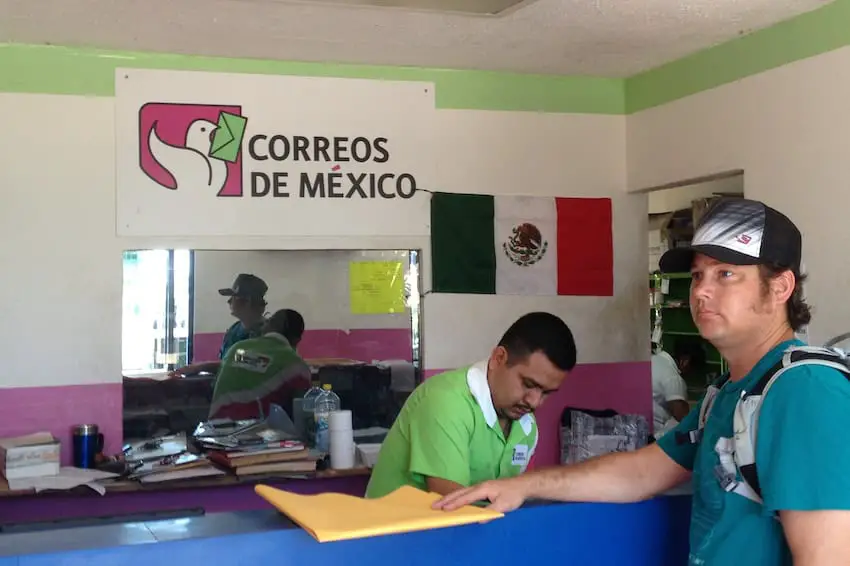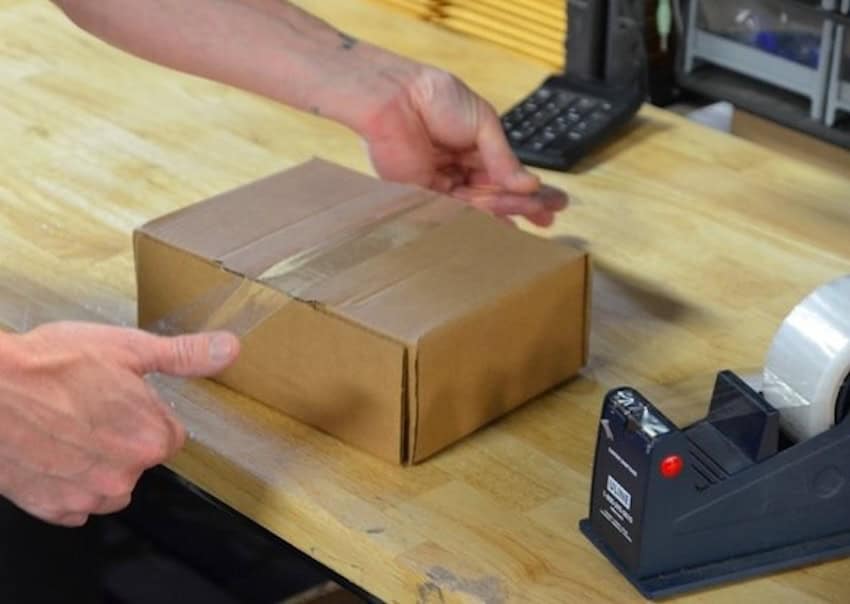Three years ago, I had just moved from Bogotá, Colombia to Playa del Carmen. We’re talking about two completely different climates, and so I had a suitcase full of winter clothes that I no longer needed. Since I didn’t want to part with them in case fate one day took me to another cold-weather city, nor did I have enough time to travel to the United States to bring the garments back, I thought my best solution would be to send them through the Mexican postal service.
Most gringo expats I know are frugal in one way or another. They may not openly admit it, but if you were to visually represent the reasons we live in Mexico as a pie chart, the purchasing power would not be a slim piece. I won’t admit that this applies to me, but I’ve somehow decided to ship my clothes home as slowly as possible.


The Correos de Mexico branch I ended up in a room that could have been a fairground attraction in another universe. A hall of mirrors, only more bureaucratic. The master of ceremonies was a portly, balding man in jeans and an unbuttoned polo shirt, sweaty and bespectacled. He moved with a kind of anxious grace like an iron chef and wasted no time in telling me that my clothes – then still in a shabby gym bag – would not be shipped unless I packed them in boxes, and that “we don’t have any spare boxes.”
Ten minutes later, I was in Chedraui, lurking behind employees stocking shelves, hassling them until one reluctantly handed over a leftover box. When I returned to the post office, I feared I’d lost my place in line. Then I remembered that lines are a fluid concept in places like these: I probably never had a seat. I stood at the entrance, trying my best to get the lone postmaster to look up from the six customers he was serving at once and notice me. All I got was a nod and an “I’ll come to you when I come to you” look.
When he checked the contents of my box a few minutes later, he nodded and gave me a thumbs up, which I assumed was what the postmaster meant for “seal.” I looked at him as Oliver Twist might look at the guy who served him porridge at the orphanage, hoping he might have some tape to spare, but he had none, he said, pointing me in the direction of a stationery shop around the corner. I bought the first roll that was offered to me, a chunky, clear ring that I would not need after the ordeal. About five more minutes later, I was back, proudly holding up my box for the postmaster to see, like a child presenting shoddy macaroni art to his parents. He was not quite as impressed. “It must be candy cane“ he said – brown tape.
The clerk at the stationery store didn’t even pretend to be shocked when I came back in. Apparently I wasn’t the first person to fall for the good old tape-and-switch technique.


The postmaster had me label my package with identical, neatly torn strips of printer paper. Why I should get four when one is all you can do to indicate where the package is going is beyond me. But he insisted anyway. “Delivery address in the middle, return address top left. All four. When you’re done, stick one on the package and give me the rest.”
I did as he said and then went a step further by applying several layers of glue to every inch of the label I had chosen for my box. stripes SubscribeHurricane season is coming,” I thought, “what if the paper gets wet and smears my writing?” The postmaster took one look at my box and sighed, now he was obviously fed up with my crap. “Just tape the edges, not the whole paper. Do it again,” he said.
I looked around to see if anyone else had been put through the same wringer. Behind me was a guy with a battered package. I kept waiting for the postmaster to give him a piece of my mind, but he seemed pleased with the man’s packing. To my right was a Cuban woman who had burst in and was heading straight for the postmaster’s counter. “Wait your turn,” he told her.
It must have taken me at least an hour to get the labels right. These errands must be the equivalent of dog years – the kind that drags out time and slowly turns you into an annoyed, desperate, submissive shadow of your former self, now ready to do things you couldn’t have imagined when you first walked into that crowded post office.


That’s why I sighed and said “OK” when my package was placed on a scale and the postmaster quoted me a price that was three times what I expected. And that’s why when I gave him my credit card but was told I could only pay cash, I spent another 20 minutes looking for an ATM instead of just returning my package. My sunk costs were just too high at that point.
It seems like we do this a lot when we emigrate. We expect everything to be laid out for us. We assume the process will be straightforward or the same as what we’re used to. The truth is that no matter how much you huff and puff and wring your hands and lament that this would never happen back home, you made a decision and you’re here now.
And because you’re probably frugal, you’re more likely to stay than pack up your boxes and start over somewhere else. There’s a beautiful finality to that that connects us as expats. There’s no turning back, you have no choice but to continue here. You’ve left your old life behind and that’s just too high a price to give up now.
Ethan Jacobs is a freelance writer and writing coach based in Playa del Carmen. He has written extensively in the narrative and short story formats, and his work has received recognition both domestically and internationally in the microfiction, short story, and narrative essay formats.




